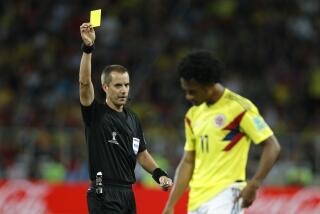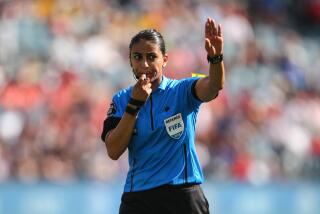Svonkin Can Call on Open Memories
- Share via
Martina Navratilova smiled at him. John McEnroe screamed at him. When he called a foot fault on Hana Mandlikova, a fan threatened to kill him.
The U.S. Open has provided umpire Scott Svonkin with a lifetime’s worth of memories, fond and otherwise.
“It’s funny,” Svonkin said. “I feel really old.”
Funny because the Canoga Park resident is only 32. Yet he is in New York City this week to work his 12th Open, ranking him as a veteran official on the professional tour.
“I grew up umpiring,” he said. “When I started, I didn’t even have a driver’s license, so [other umpires] had to drive me to matches.”
Svonkin started as a junior tennis player who realized his dream of reaching the Open as a competitor was slipping away. The big kid simply wasn’t quick enough on the court.
At the time, he was also a reporter for his junior high school newspaper and wrangled an interview with John Coman, a long-time Southern California tennis official.
“He had such great stories,” Svonkin said. “He had umpired around the world, so many matches.”
The cub reporter was struck by inspiration. “I knew I wasn’t going to make it to the U.S. Open as a player,” he said. Suddenly, he saw another way.
The United States Tennis Assn. had no age limit for umpires, so Svonkin attended the association’s officiating school and was certified. At 15, he became the youngest umpire in the nation.
Though something of a novelty, the kid had Coman and other veteran officials vouching for him. His size--he was on the way to being 6 feet 2 and 195 pounds--became an attribute.
“The players weren’t really sure how old I was,” he said. “And I gave really loud calls.”
It took only a year of umpiring junior and college matches before the USTA invited Svonkin to work his first Open. He was 16. The following summer, he chaired his first match at the tournament, looking down on Patrick McEnroe and former USC star Eric Amend.
Umpiring became a way of life, a passion that filled his free time as he finished high school and earned a degree at Cal State Northridge. Svonkin was drawn to the drama of the work, the need for absolute concentration under intense circumstances.
“The players are playing for huge amounts of money and you’ve got 8,000 people in the stands yelling at you,” he said. “You’ve got to be totally focused on your job and make that call in a split second.”
There were players who showed appreciation for umpires--Navratilova and the gracious Pete Sampras and Michael Chang.
But there were also players such as John McEnroe, who often berated officials.
“Some of them complain with anger,” he said. “It gets very ugly and very personal.”
After the Mandlikova fan threatened Svonkin--he was 18--Open officials assigned a bodyguard to protect him the rest of the day. Eventually, the rigors of the job became too much.
Svonkin took a break after college. Umpiring paid less than part-time wages--officials make a few thousand dollars at the Open--so he began a career, working first as a health care executive and later as a consultant to non-profit organizations. But he couldn’t stay away from tennis for more than a few years.
“I got some perspective on it,” he said. “Tennis officiating is important to me.”
These days, he umpires six to eight weeks a year. That includes all the pro tournaments in Southern California, as well as some junior and charity events.
But the highlight of his tennis season remains these two weeks at the USTA National Tennis Center in Flushing Meadow.
Already Svonkin has worked a gut-wrenching, first-round match between Paul Goldstein and Andrew Ilie, who retired in the fourth set with cramps so severe he could not unclench his fingers or stand up straight. Friday night, he worked the stadium court before packed stands and a national television audience.
This is where he feels the electricity of the New York fans, the thrill that makes up for all the verbal abuse and the occasional bodyguard.
“The crowd here is different than any crowd in the country,” he said. “It’s just exciting to be on the court with all that is going on.”
More to Read
Go beyond the scoreboard
Get the latest on L.A.'s teams in the daily Sports Report newsletter.
You may occasionally receive promotional content from the Los Angeles Times.











